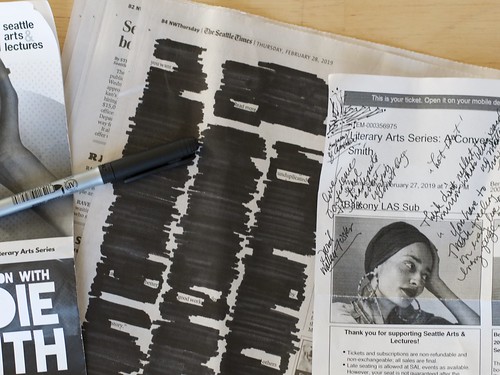
Lecture notes using the method of blackout poetry, which limits word choice to the vocabulary within a news story.
“You have to think freely on every line, on every page,†novelist and essayist Zadie Smith said. Ignore the “hot tweet,” she cautioned, as well as the feelings of inadequacy about writing what you do not know.
Instead, use curiosity and love of a subject to overcome lack of confidence, Smith said, and avoid social media’s echo chamber. But whether or not they are a defense against cultural appropriation of another’s heritage was a question Smith dodged during the Seattle Arts and Lectures event, an adeptness first revealed months earlier when she declined to be interviewed by the alternative weekly newspaper.
With that sidestep, I distilled her talk into four pithy sentences, using the method of blackout poetry, condensing the advice into lecture notes constrained by the vocabulary of a day’s news story:
You want a better story. Focus wisely. Read more. Do good work, unduplicated by others.
Here are two additional random notes from Smith’s meandering conversation:
During the Q&A, Smith mentioned how much she enjoyed drinking; the audience followed up with a question about her favorite drink. Vodka martini, she replied. I’m fan of neither vodka nor martinis, but like Smith I know my answer to the bartender’s question: What can I get you? A signature drink reduces choice, leaving me to converse or people watch, and it gives me a chance to evaluate, compare, and rank a bartender’s skill. So sidecars, like blackout newspaper poetry, is my definition of fun.
Another diversion of mine: to dissect a writer’s work. Discovering that Fatou, the protagonist in Smith’s short story “The Embassy of Cambodia,” was among her favorite characters gave me reason to reread the New Yorker story in order to sleuth out why. “The Embassy of Cambodia” is about the young Ivory Coast immigrant Fatou who works as a maid for a Pakistani family in northwest London. The family has taken away her passport and withheld her salary, claiming that it pays for her room and board. Fatou becomes fascinated by the Cambodian Embassy, housed in a suburban villa that she passes on her way to the pool. Each time, she pauses to watch a badminton game being played on the other side of the embassy’s high fence.
“… Over the high wall she sees a shuttlecock, passed back and forth between two unseen players. The shuttlecock floats in a wide arc softly rightward, and is smashed back, and this happens again and again, the first player always somehow able to retrieve the smash and transform it, once more, into a gentle, floating arc. High above, the sun tries to force its way through a cloud ceiling, gray and filled with water. Pock, smash. Pock, smash.”
Badminton’s scoring system lends structure to the story. Sports is an analogy which, Smith explained in a 2013 interview,” allowed her to think about the way people win and lose in life. Fatou is tough, resilient, vulnerable, and intelligent. She’s reaching for understanding beyond the limitations of her own knowledge. Smith writes in “The Embassy of Cambodia,”
“In a discarded Metro found on the floor of the Derawal kitchen, Fatou read with interest a story about a Sudanese ‘slave’ living in a rich man’s house in London. It was not the first time that Fatou had wondered if she herself was a slave, but this story, brief as it was, confirmed in her own mind that she was not.”
Imperfect knowledge, Smith said, was important to her fiction.
“It seems to me that we often commit ourselves wholly to something while knowing almost nothing concrete about it. Another word for that, I suppose, is ‘faith.’ I fully believe in global warming, for example—but what do I really understand of the science? Very little. If I tried to explain it to someone who had just landed from another planet I would only talk a lot of ill-informed nonsense at them—an approximation of the truth, a sliver of what I’ve gleaned from the articles I’ve read and half-comprehended. The thing that can be challenging in fiction is allowing people to exist imperfectly. … I want to write without shame or pride or over-compensation in one direction or another. To write freely.”
Think freely. Drink freely. Write freely.
- Zadie Smith and “The Embassy of Cambodia.”
- Blackout poetry.
- Sidecar.
- The Stranger doesn’t get the interview.
Leave a Reply